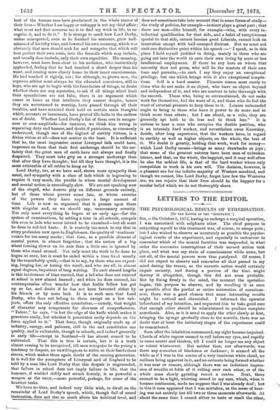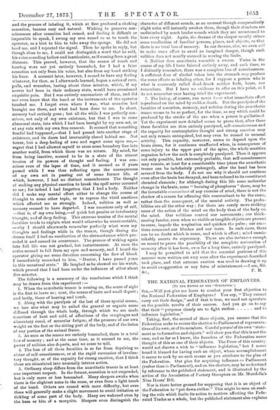LETTERS TO THE EDITOR.
THE PSYCHOLOGICAL RESULTS OF ETHERLSATION.
(TO THE EDITOR Or THE "SPECTATOR.")
Sin, —On October 5, 1872, having to undergo a surgical operation, I was narcotised with sulphuric ether. The chief purpose in subjecting myself to this treatment was, of course, to escape pain ; but also wished to observe as accurately as possible the psycho- logical results of the experiment, and especially to endeavour to remember which of the mental faculties was suspended, in what order the successive interruptions of their normal action took place, and what was my state of consciousness while some, but not all, of the mental "powers were thus paralysed. Of course, I did not expect to observe and remember all that passed in my mind during the trance, as the narcotic action would certainly impair memory, and during a portion of the time might destroy it altogether, though this did not seem probable. But by fixing firmly in the mind, the moment the operation began, this purpose to observe, and by recalling it as soon as possible after the partial or entire restoration of conscious- ness, there was a good chance that some interesting results might be noticed and chronicled. I informed the operator beforehand of my intention, and requested him to take good care that enough ether should be administered to produce complete ansesthesia. Also, as it is usual to apply the ether slowly at first, bringing the sponge gradually close to the nostrils, there was no doubt that at least the initiatory stages of the experiment could be remembered.
Soon after the inhalation commenced, my sight became impaired. Clouds of white vapour seemed to roll before my eyes, and rapidly to come nearer and thicken, till I could no longer see any object or colour whatsoever. But neither then, nor afterwards, was there any sensation of blackness or darkness ; it seemed all the while as if I was in the centre of a very luminous white cloud, no outlines being apparent in it, and no estimate being formed whether it was near or remote, although there was an indistinct impres- sion of wreaths or folds of it rolling over each other, or of the whole mass slowly gyrating round a centre. Next, there seemed to be a light, whirring sound in my ears, which, when it became continuous, made me suppose that I was already deaf but in this it soon appeared that I was mistaken, as the sense of bear- ing was not entirely lost till two or three moments afterwards. At about the same time I ceased either to taste or smell the ether,
and the process of inhaling it, which at first produced a choking sensation, became easy and natural. Wishing to preserve con- sciousness after sensation had ceased, and finding it difficult or impossible to speak, I swung my arm round HO as to touch the operator, as a hint to him to take away the sponge. He did not heed me, and I repeated the signal. Then he spoke in reply, but though close to me, I could not distinguish a word that he said, his voice sounding hollow and inarticulate, as if coming from a great -distance. This proved, however, that the senses of touch and hearing were not yet entirely benumbed, for I had a faint sensation not only from his voice, but also from my hand striking his knee. A moment later, however, I ceased to have any feeling whatever, for then, as I afterwards learned, began a series of cuts, pulls, and wrenches, lasting about three minutes, which, if my nerves had been in their ordinary state, would have occasioned exquisite pain. But I was entirely unconscious of them, and did not even know that the hand or the instruments of the operator touched me. I forgot even where I was. what occasion had brought me there, and what had been done to me. In short, memory had entirely gone ; but all the while I was perfectly con- scious, not only of my own existence, but that I was in some abnormal state, into which I had been brought by my own act, or at any rate with my own free consent. It seemed that something fearful had happened,—that I had passed into another stage of existence, and its doors had irrevocably closed behind me. Not terror, but a deep feeling of awe and regret came upon me,— regret that I had allowed myself to cross some boundary line into another world, from which there was no return. My mind, far from being inactive, seemed to be in a state of the utmost tension of its powers of thought and feeling. I was con- scious even of the lapse of time, and it seemed as if years passed while I was thus reflecting upon the consequences -of my own act in passing out of some former life, of which, however, I had no distinct remembrance The thought
of making any physical exertion to break the spell never occurred to me ; for indeed I had forgotten that I had a body. Neither did I make any mental effort either to change the course of thought to some other topic, or to repress the vivid emotions avhich affected me so strongly. Indeed, volition as well as
memory seemed to have departed. I was conscious only of self, —that is, of my own being,—of quick but passive or involuntary thought, and of deep feeling. This extreme tension of the mental faculties tends to explain what would otherwise be unaccountable, —why I should afterwards remember perfectly what were my thoughts and feelings while in the trance, though during the -dream itself I had no recollection of the circumstances which pre- -ceded it and caused its occurrence. The process of waking again into full life was not gradual, but instantaneous. At once the scales seemed to fall from my eyes and memory, and I heard the -operator giving me some direction concerning the flow of blood.
I immediately remarked to him, "Doctor, I have passed years in this unnatural state." He laughed as he showed me his watch, which proved that I had been under the influence of ether about five minutes.
The following is a summary of the conclusions which I think may be drawn from this experiment :- 1. When the armathetic trance is coming on, the sense of sight is the first to leave us ; next, the senses of taste and smell depart ; and lastly, those of hearing and touch.
2. Along with the paralysis of the last of these special senses, we lose also what may be called the general or organic sense 'diffused through the whole body, through which we are made conscious of heat and cold, of affections of the cesophagus and alimentary canal, of muscular fatigue, of the pressure of our own weight on the feet or the sitting part of the body, and of the lesion of any portion of the animal frame.
J. As soon as the senses are entirely benumbed, there is a total lo..s of memory ; and at the same time, as it seemed to me, the power of volition also departs, and we cease to nil!.
4. The loss of all these faculties is so far from depriving us ci tiler of self-consciousness, or of the rapid succession of involun- tary thought, or of the capacity for strong emotion, that I think these are stimulated into unusually intense action.
.5. Ordinary sleep differs from the anmthetic trance in at least one important respect. In the former, sensation is not suspended, but is only more or less benumbed. Many sleepers awake when there is the slightest noise in the room, or even from a light touch of the hand. Others are roused with more difficulty, but even these will generally make a slight movement to avoid irritation or tickling of some part of the body. Many are wakened even by the hum or bite of a mosquito. Sleepers even distinguish the
character of different sounds, as an unusual though comparatively slight noise will instantly awaken them, though their slumbers are undisturbed by much louder sounds which they are accustomed to hear every night. Again, the dreams of the sleeper usually evince some recollection of familiar persons, places, and objects, so that there is no total loss of memory. In our dreams, also, we even will to make some effort to avoid an imagined danger, though such volition does not usually succeed in moving the limbs.
6. Neither does anmsthesia resemble a swoon. Twice in the course of my life I have fainted entirely away, and each time, as I distinctly remember, there was a complete loss of consciousness. A. sufficient dose of alcohol taken into the stomach may produce the same effects as inhaling ether, for I suppose a person who is what is commonly called dead-drunk neither feels, bears, nor remembers. But I have no evidence to offer on this point, as I do not remember ever having tried the experiment.
7. The living, of course, can never know what immediate effect is produced on the mind by sudden death. But the paralysis of the faculties of sensation, memory, and volition during the anmstbetic trance seems to be as perfect, for the time, as any which could be produced by the stroke of the axe when a person is guillotined. Yet the experiment now detailed seems to prove that, after these three faculties are thus entirely paralysed, self-consciousness and the capacity for contemplative thought and strong emotion may not only remain unimpaired, but may even be roused to unusual activity. This capacity, moreover, seems to depend upon the brain alone, for it continues unaffected when, in consequence of some injury to the upper part of the spine, the whole sensitive organism below the neck is completely paralysed. Then it appears not only possible, but extremely probable, that self-consciousness may remain, at least for a considerable time (since the anaesthetic trance can be indefinitely prolonged), after the head has been severed from the body. I do not see why it should not continuo even after the brain has decayed, and been reduced to its constituent chemical elements ; for although during this life some molecular change in the brain, some "burning of phosphorus" there, may be the invariable concomitant of any exercise of mind, there is not the shadow of a reason for affirming this concomitant to be the cause, rather than the consequent, of the mental activity. The proba- bilities are all the other way ; for there are surely more striking cases of the action of the mind on the body than of the body on the mind. Our volitions control our movements ; our thick- coming fancies, even when no visible or tangible objects are present to sense, impede the respiration and quicken the pulse; our emo- tions command our blushes and our tears. In such cases, there can be no doubt which is cause, and which is effect ; mind unmis- takably asserts its supremacy. There are also instances enough on record to prove the possibility of the complete restoration of
memory after it has been, even for a long time, entirely paralysed. I may be permitted to add that the essential portions of this account were written out very soon after the experiment described took place, and that extreme caution was used in drawing it up to avoid exaggeration or any form of misstatement.—I am, Sir,



































 Previous page
Previous page